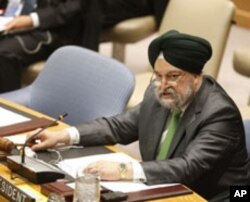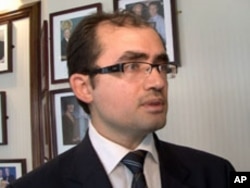Throughout the Arab Spring, the international community has been forced more than once to grapple with perhaps the most challenging policy dilemma of all: At what point should outsiders intervene in a country’s internal conflict and, more specifically, what does it take to bring down a determined dictator?
Tunisia’s Zin al Abbeddine Ben Ali folded his cards early in the game. Egypt’s Hosni Mubarak was more stubborn but was gone in a matter of weeks. Libya’s Muammar Gadhafi has not been so cooperative with his critics.The resulting NATO-led military intervention has not only failed in its mission to pry Libya out of Gadhafi’s clutches, but, say analysts, exposed Western shortsightedness and shortcomings.
Now the international community is up against another tenacious leader - Syria’s Bashar al-Assad. As his bloody crackdown on protesters continues into Ramadan, Syrians are becoming more vocal in their pleas for Western support. Nearly every player in the West agrees that something must be done. But what?
Pressure from without
Hours of debate between members of the U.N. Security Council this week failed to reach agreement on a resolution first proposed in May. Instead, the Council adopted a Presidential Statement condemning “widespread violations of human rights and the use of force against civilians by the Syrian authorities.” The statement also calls for responsible parties to be held accountable, but it stops short of imposing sanctions or making any other demands - such as referring Assad to the International Criminal Court for crimes against humanity – a move some member states had been pushing for.
Mohamed Alabdullah, the U.S. spokesman for the Local Coordination Committees (LCC), a coalition of grassroots activists in Syria, says he is disappointed the Security Council could not come up with a tough resolution. “The statement is good,” he said, “but it’s considered as a lame action, and the government in Syria, they interpret such a lame statement as a green light to continue killing people - ‘Now we can kill as much as we want."
Alabdullah had harsh words for Russia, the most vocal opponent to a resolution: “Russia is helping in the killing of Syrians.”
It is chiefly the Russians who have blocked European efforts to impose stricter sanctions, says Mona Yacoubian, Special Adviser at the Center for Conflict Analysis and Prevention and Director of the Lebanon Working Group at the Washington, D.C.-based U.S Institute of Peace (USIP). However, as the level of violence increased this week, she believes that Russia may gradually relent.
“The Russians are beginning to issue some statements indicating their displeasure with what’s happening in Syria,” Yacoubian says, “and I think what will be important is more behind-the-scenes diplomacy to assure the Russians that we’re not seeking to undertake another NATO engagement at this time in Syria, but rather that we’re looking for more intensive diplomatic and economic pressure to be placed on the regime in Damascus.”
Another question is why have neighboring Arab countries been reluctant to speak out.
“I think the fear is that Syria would descend into all-out chaos and sectarian conflict,” says Yacoubian. “It’s not a fully unfounded fear. On the contrary, we’re seeing already some disturbing indications that there may be the beginnings of that. But that has certainly served as a check on people pushing harder against the Syrian regime.”
|
Syria's Hama - Flashpoint City |
|
For a second time, the Syrian city of Hama has become a flashpoint of dissent against a government led by a member of the Assad family.
|
Yacoubian concedes that Turkey has issued some fairly strong statements warning the Assad regime against what it calls another massacre in Hama,” such as that which was launched in 1982 by Bashar al-Assad’s father, Hafez.
The Arab League and the Organization of Islamic Conference have been conspicuously absent from debate. “Unfortunately, the silence of the Arab League and the Organization of Islamic Conference is hurting us, because we expected them to support us in our cause for freedom,” said Radwan Ziadeh, founder of the Damascus Center for Human Rights Studies (DCHRS). “But that’s because, as we know, the overwhelming [number] of these countries are not democratic. This is why we don’t expect much from them.”
Sanctions with teeth
According to the International Monetary Fund and other official sources, oil sales account for around one-third of Syria’s revenue; taxes and tourism revenue make up the rest. Needless to say, Syria is not hosting many vacationers this summer, and the uprising is costing Syria a small fortune, says leading Syrian dissident Ausama Monajed.
“The regime needs money to pay for the thugs, to pay for the increase of wages they announced for public sector workers, and the reserves of the banks are just going down further and further,” he said.
Monajed says the regime has paid out more than $20 billion in the past few months. “There only remain about $12 billion of reserves in the country - that’s certainly not enough to sustain the military assaults. The main source of hard currency at the moment are the oil revenues - about $7-8 million a day, and these are being used to buy bullets and to pay for the security forces, the thugs, and killing people.”
Thus, says Monajed, it wouldn’t take much in the way of sanctions to push the regime over the edge. The challenge, however, would be to impose sanctions that do not amount to collective punishment of the Syrian people.
This week, U.S. Senators Kirsten Gillibrand (D-NY), Mark Kirk (R-IL), and Joseph Lieberman (I-CT) introduced the Syria Sanctions Act of 2011. The bill, if passed, would require the U.S. administration to impose tougher sanctions on Syria, similar to those imposed on Iran, until Syria transitions to a democracy and ends both its support for terrorists and its weapons programs.
The legislation would, in essence, make it harder for companies who invest in Syria’s energy sector to do business in the United States. A senior staffer close to Senator Lieberman’s office said it could take some time for the bill to be passed; in the meantime, its sponsors hope that European and other energy companies will see the handwriting on the wall and voluntarily disengage from doing business with Damascus.
Pressures from within
Are there signs that the Assad regime could crumble by itself?
“Certainly,” said Ausama Monajed. “We’re seeing increasing numbers of defections in the military. Also, higher ranks now are defecting - even the security forces, the intelligence agents now realize that the regime is collapsing, so why don’t we make some money [they ask themselves]?"
These days in Syria, according to Monajed, intelligence is up for sale. “You can buy the fines; you can clear names, just by paying bribes to these corrupt agents.”
Further, Monajed points to growing disillusionment among the so-called shabiha, the mob-style thugs who are paid as much as $200 a day to put down protesters.
“Some of them haven’t been paid in about two weeks now, and many of them have returned to their villages in the coastal area." The shabiha, he explains, are discovering that they can make more money by returning to their normal business of smuggling, drug running and prostitution. To Monajed, it’s clear: “The military and security sectors now realize that the regime will fall. It’s only a matter of time before we see defections at the highest levels of the military, a sort of coup at the top levels. It’s only a matter of when rather than if.”
The LCC’s Alabdullah isn’t so sure. He says he has spoken to several defectors who complain that now that they’ve left the military, they have “no value.”
“We are not going to witness more defections in the Army,” said Alabdullah, “unless those leaders in the army, especially the high-ranking ones, see the international community is taking responsibility, and it will be a done deal. The U.S. and E.U. should do something to encourage the Army to start defecting, especially the leaders. And this could be the start of a revolution referring Assad’s regime to the ICC.”
Early on in the protests, the U.S. and the international community believed that Syria’s population was too fractured to take on a revolution. The Assad family belongs to the minority Alawite sect, a branch of Shi’a which amounts to only about 12 percent of the total Syrian population. Other minorities include Christians and Kurds. The remaining majority are Sunni Arab, divided between those who sympathize with Islamists and those who are loyal to Assad and his largely secular Ba’ath Party. Until recently, Christians tended to distance themselves from the protests, fearing that an end to the Assad regime would only usher in Islamists.
A group of Syrian American activists met with U.S. Secretary of State Hillary Clinton and other State Department officials this week. Heading the delegation was DCHRS chief Radwan Ziadeh. He characterized the meeting as warm. “We expressed our views about what we need exactly from the United States,” said Ziadeh. “We need President Obama to address the courage of the Syrian people in the street and ask Bashar al-Assad to step down immediately.”
Ziadeh said that one of the Secretary’s chief concerns is a lack of unity among the Syrian population - and the opposition in particular. “She asked about the kind of transition, and about the minorities’ fate after the transition,” said Alabdullah. “It’s a legitimate question. Our team included, as well, people from minorities where there is this concern, saying that Christians are involved in the protests in Syria and they are partners in this. And, of course, the Alawite community as well.”
Activists say that more and more minority groups are joining in the daily protests during Ramadan. Syria’s middle class has so far managed to remove itself from the crisis, however, activists are predicting that as the Syrian Treasury strains to make payroll, all that could change and allegiances could shift.
Theories abound that there are cracks within the Assad family and inner circle itself. “I personally don’t subscribe to that,” says USIP’s Mona Yacoubian. “I think in many ways it’s a matter of realpolitik. It’s very clear that Bashar al-Assad, his regime, its very survival, depends on a continuation of the kinds of repressive practices that they are undertaking. He’s really shown no inclination toward any sort of genuine reform, and frankly, he’s had eleven years to implement reforms, and nothing of the sort has really happened."
Everyone - protesters, activists and international observers - agrees that the killings cannot continue. With or without international support and sanctions, it appears that in the end the Syrian people will ultimately bring down the regime. The protesters have made it clear that the cost of continuing the revolution is much lower than the ultimate cost of quitting. In the end, freedom for Syrians may come at quite a heavy cost indeed.
[5 Aug - spelling of 'whither' in title corrected - thank you alert readers]









